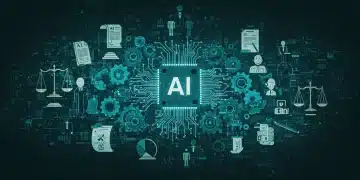AI decision-making ethics: why it matters now

The future of AI decision-making ethics focuses on transparency, collaboration, and continuous monitoring to ensure fair, accountable, and unbiased AI systems that benefit society.
AI decision-making ethics is becoming increasingly critical as technology advances. Have you ever considered how AI affects your daily choices? Let’s delve into this essential topic.
Understanding AI decision-making
Understanding AI decision-making is crucial as these technologies shape our lives. With AI systems analyzing data and making choices for us, it’s important to explore how they function and the impact they have.
AI decision-making refers to the processes by which machines use algorithms to analyze data and make autonomous decisions. These systems learn from past experiences and adapt their methods over time. By doing so, they can operate more efficiently and effectively.
How AI Works
At its core, AI decision-making involves several steps. Machines gather data, evaluate it, and apply algorithms to reach conclusions. You may wonder: how do they decide what data to use? The AI assesses patterns and trends in large volumes of information, which helps in performance.
Key Elements of AI Decision-Making
- Data Collection: AI systems need vast amounts of relevant data to learn effectively.
- Algorithms: These mathematical instructions guide the decision-making process.
- Feedback Loops: AI learns from the outcomes of its decisions, refining its models over time.
As AI decision-making advances, ethical considerations become more important. How do we ensure the choices made by AI systems align with human values? The answer lies in careful regulation and ongoing oversight.
Moreover, as we rely more on AI, understanding its capabilities and limitations is essential. This insight will prevent over-reliance on technology, maintaining a healthy balance between human input and AI innovation. With informed discussions and awareness, we can harness the power of AI decision-making for positive outcomes.
By understanding the fundamentals of AI decision-making, we can better navigate a future where technology plays an integral role in our daily lives.
Key ethical principles in AI
Key ethical principles in AI guide the development and use of artificial intelligence technologies. These principles help ensure that AI systems operate fairly and responsibly. By understanding these principles, we can navigate the complexities of AI in our daily lives.
One major principle is transparency. AI systems should be clear in how they function and make decisions. Knowing how an AI arrives at a conclusion allows users to trust the system more and hold it accountable.
Fairness in AI
Fairness is critical to prevent biased outcomes in AI decision-making. Developers must ensure that AI systems consider all relevant groups equally. This means actively working to eliminate biases present in training data, which can skew results and lead to unfair treatment.
Accountability and Responsibility
AI technologies must adhere to the principle of accountability. This principle emphasizes that organizations deploying AI should take responsibility for their actions. When an AI system causes harm, developers and users need to be accountable for its decisions.
- Data Privacy: Protecting user data is a major concern.
- Inclusivity: AI should serve everyone, regardless of background.
- Sustainability: Considering environmental impact in AI development.
- Human oversight: Keeping humans in the loop can prevent risks.
Another important principle is human oversight. AI should not operate entirely without human involvement. Maintaining human input ensures that ethical considerations remain at the forefront, especially in critical situations. This principle emphasizes collaboration between humans and machines.
As we dive deeper into the world of AI, recognizing these key ethical principles will help guide the technology toward a more responsible future. By encouraging discussions around ethics, we can shape AI to enhance, rather than hinder, society.
Real-world examples of AI ethics

Real-world examples of AI ethics can help us understand how ethical considerations are implemented in practice. By examining specific cases, we can see both positive outcomes and challenges faced by organizations using AI technologies.
One notable example is in the field of hiring. Some companies have implemented AI systems to screen resumes. However, it has been found that these systems can exhibit bias, favoring certain candidates based on historical data. This has led to discussions about the need for fairness and transparency in AI decision-making processes.
Healthcare Applications
In healthcare, AI is used to analyze patient data for better treatment options. For instance, AI algorithms help diagnose diseases more accurately. However, ethical concerns arise regarding patient privacy and the security of sensitive information. Ensuring that patient data is handled responsibly is crucial.
Facial Recognition Technology
Another example of AI ethics in action is facial recognition technology. Some governments and organizations have adopted this technology for security purposes. While it can enhance safety, it also raises concerns about surveillance and potential misuse. Striking a balance between safety and privacy is vital.
- Autonomous Vehicles: Companies are developing self-driving cars. Ethical dilemmas arise when considering how these vehicles should react in emergency situations.
- Content Moderation: Social media platforms rely on AI to filter harmful content. This process needs to ensure freedom of expression while minimizing harm.
- Algorithmic Pricing: Businesses use AI to set prices based on demand. This practice can lead to price discrimination, prompting ethical questions about fairness.
By analyzing these real-world examples of AI ethics, we can better understand the importance of considering ethical principles in technology development. These cases remind us that the implementation of AI systems must prioritize ethics to serve society effectively.
Challenges in enforcing ethical AI
Challenges in enforcing ethical AI are significant and complex. These challenges arise from the rapid pace of technological advancement and the varied interpretations of ethics across cultures and industries. Understanding these issues is essential for effective governance of AI technologies.
One major challenge is the lack of standard guidelines for what constitutes ethical AI. Different organizations may define ethics in various ways. This inconsistency can lead to confusion in implementing practices that prioritize fairness and accountability.
Data Privacy Issues
An important challenge is addressing data privacy. As AI systems rely heavily on data, safeguarding personal information is crucial. Organizations must comply with regulations like GDPR, which can be complicated and costly to implement.
Bias and Discrimination
Another ongoing issue is the presence of bias in AI algorithms. AI systems learn from historical data, which may contain prejudices. This can result in discriminatory practices in areas like hiring or lending. Ensuring unbiased outcomes requires continuous monitoring and testing, but many organizations lack the resources or expertise.
- Lack of Transparency: Many AI systems operate as ‘black boxes,’ making it hard for users to understand their decision-making process.
- Accountability Gaps: Determining who is responsible for unethical AI decisions—developers, companies, or users—can be problematic.
- Regulatory Challenges: Governments may struggle to keep pace with AI technologies, resulting in outdated regulations.
The necessity for collaboration between stakeholders is vital in tackling these challenges. By bringing together ethicists, technologists, and policymakers, solutions can emerge that address these issues effectively.
Moreover, educating everyone involved about the ethical implications of AI is essential. This shared understanding can bridge the gap between technology and ethics, fostering responsible AI practices.
Future of ethical AI decision-making
The future of ethical AI decision-making holds great promise and challenges. As technology continues to evolve, understanding how to integrate ethical standards into AI systems becomes increasingly vital. This integration will help ensure that AI serves society positively.
One significant direction for ethical AI decision-making is the development of comprehensive frameworks. These frameworks can provide guidelines for organizations to follow, ensuring that AI systems are built with ethics in mind. Companies can create responsible .
Collaboration Across Sectors
Another promising aspect is collaboration across various sectors. By bringing together researchers, industry leaders, and policymakers, we can create solutions that balance innovation with ethics. This partnership aims to create standards that promote fairness and accountability.
AI Transparency and Explainability
Moreover, a focus on transparency and explainability will shape the future. Users will demand to understand how AI makes decisions. As a result, developers will need to create systems that not only deliver results but also explain the logic behind their actions.
- User Education: Teaching users about how AI systems work can foster trust.
- Continuous Monitoring: Regularly assessing AI systems for ethical compliance helps improve outcomes.
- Inclusive Design: Developing AI with diverse teams can prevent bias and ensure fairness.
As AI becomes more embedded in our lives, considering the ethical implications is crucial. Stakeholders must actively engage in discussions about the impact of AI on society to shape a positive future.
Ultimately, the future of ethical AI decision-making lies in our collective efforts. By prioritizing ethics in AI development, we can pave the way for a technology that benefits everyone.
In summary, the future of ethical AI decision-making is filled with potential. By focusing on transparency, collaboration, and education, we can tackle the challenges that arise as AI technologies develop. The importance of creating fair and accountable AI systems cannot be overstated. It is essential for all stakeholders to work together, ensuring that technological advancements benefit everyone while respecting ethical standards. As we move forward, continuous dialogue about ethics will be key to driving positive change and fostering trust in AI.
FAQ – Frequently Asked Questions About Ethical AI Decision-Making
What are the main ethical principles in AI?
The main ethical principles in AI include transparency, accountability, fairness, and data privacy, which guide how AI systems should operate.
Why is transparency important in AI?
Transparency is important because it allows users to understand how AI systems make decisions, which builds trust and enables proper accountability.
How can collaboration improve ethical AI?
Collaboration among researchers, industry leaders, and policymakers can create better guidelines and standards that ensure AI systems are developed ethically.
What challenges do organizations face in implementing ethical AI?
Organizations face challenges such as lack of standard guidelines, potential biases in algorithms, and difficulties in ensuring data privacy.





